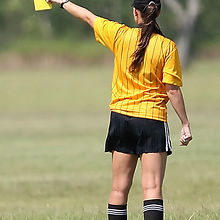AYSO Referees
Cedar Rapids / Marion and Surrounding Areas
FAQ
Here we go!
Q: What's the deal with the Build Out Line?
A: The short answer is that it is designed to promote the skills needed to build out from deep within a team's defensive third. As referees, our job is to enforce it to the best of our abilities. As AYSO referees, our job is also to help teach the young players how to play within the restrictions of the BOL. More details for refereeing this directive from USSF can be found under the Helpful Links -> Referee Documents on the menu.
Q: What are the age requirements for my child to referee?
A: Generally speaking, your child will need to be 2+ years older than the division he/she wishes to referee.
-
8U - 10+
-
10U - 12+ (Regional)
-
12U - 14+ (Intermediate)
-
14U - 16+ (Advanced)
-
16U+ - 18+ (National)
You can refer to this chart to see all the requirements for each level.
Q: I'm a coach who must sometimes referee my own games. Is it OK for me to coach on the field?
A: No. Nope. Uh-uh. It's unfortunate that our coach's sometimes have to pull double duty. But if the referee is coaching, who's refereeing? Have the assistant coach or a parent manage the substitutes on the bench while you referee. Remember, the Referee's job is to ensure a SAFE, FAIR, FUN environment for the players. If you're coaching your kids, then the spectators, and the opposing players and coaches will not see you as being FAIR, and the game won't be FUN for them, not to mention that you may miss something that makes the game less SAFE.
If you can't restrain yourself from coaching when you should be refereeing, then RECRUIT A PARENT TO TAKE THE REFEREE TRAINING!
Q: My referee at my last game was an idiot.
A: First, let me point out that that's not a question. Second, referees, like coaches, players, and spectators, come in all shapes, sizes, experiences, knowledge, and abilities. If you truly think that your referee was biased, or unqualified, follow this checklist.
-
Keep in mind, they are volunteers willing to spend parts of their weekend to referee so you don't have to. We provide mentors, training, and resources to help our referees improve. But they are all still human.
-
The Laws of the Game are written to be flexible so that the game can flow with as little stoppage as is necessary to maintain order. The referee has a wide latitude to either make or not make calls based on what he/she sees, how the game is being played, and (most importantly) by his/her opinion of what just happened.
-
Become a referee yourself. And by this I mean more then simply taking the Basic Referee Training. Get out there and DO IT. Many, many games. The players learn the game of soccer by playing. Referees learn it by refereeing. If you think you can do better then your last referee, put your money where your mouth is.
-
Have you done all of the above? OK, now you can report the incident to your Referee Administrator. He or She will be glad to send out trained and certified Referee Assessors to evaluate the referee. Although you should be prepared to hear that the referee is doing acceptable work based on his/her training and experience.
